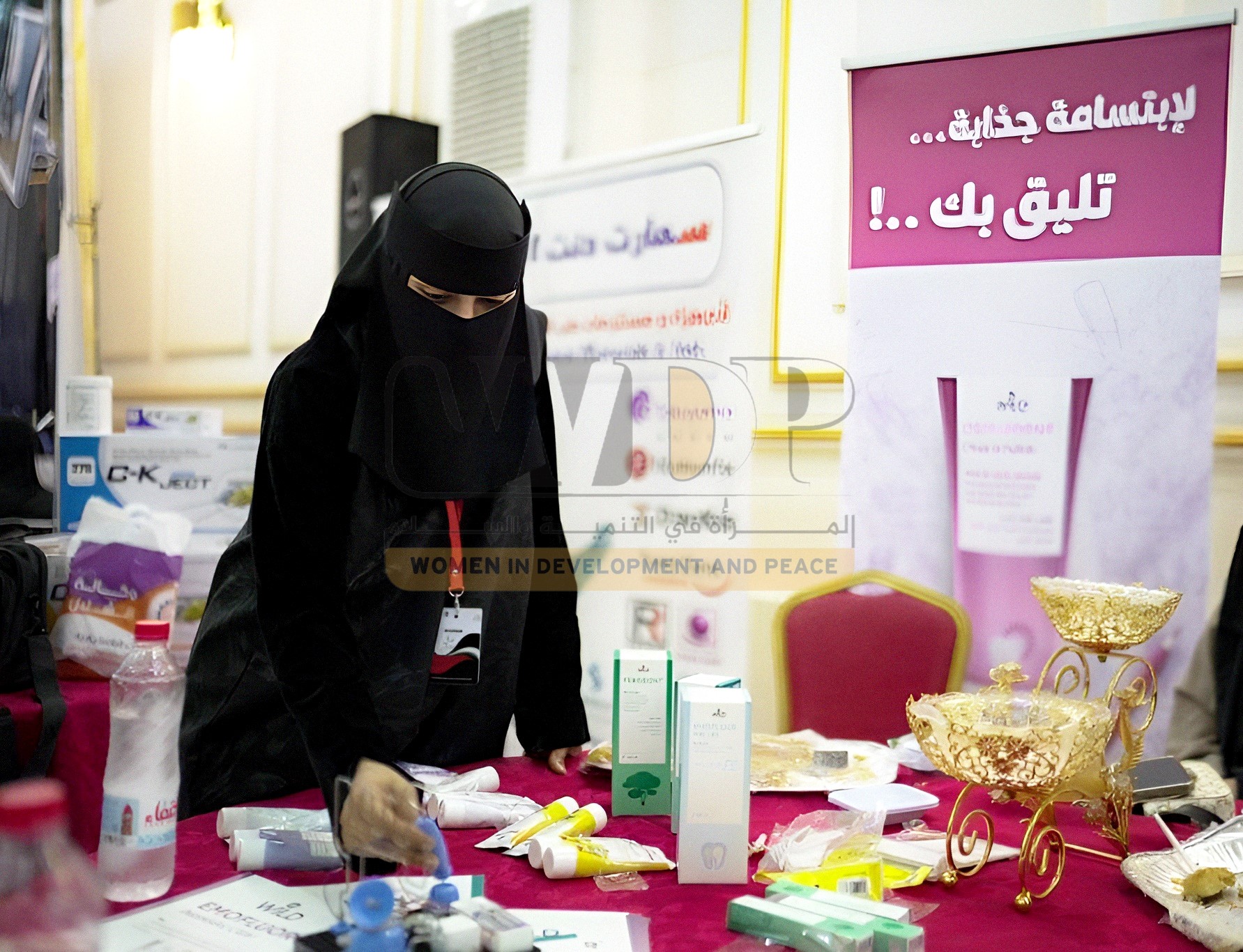 Dr. Fawzia Nashir
Dr. Fawzia Nashir
President of the Yemeni Businesswomen Council
Head of the Businesswomen Committee at the General Union of Yemeni Chambers of Commerce and Industry
( Advisor for Businesswomen and Women’s Economic Empowerment in Yemen)
Achieving comprehensive development is a dream that haunts every society in the world, and a cornerstone for a promising future. To achieve this dream, all efforts must come together, with all members of society playing complementary roles, without exception. This is crucial for achieving the desired development. It requires widespread participation of both women and men “together in various economic sectors.”
Comprehensive development cannot be achieved without the active participation of a large segment of society that represents its other half, the influential and most important element: women. Women’s active participation in economic fields is a fundamental lever for boosting productivity at work. Therefore, it is increasingly important to involve women in the process of social and economic development, leading to the enhancement of the production process. This, in turn, will reduce the gap between men and women in terms of acquiring skills, investing their potential, and empowering them.
Yemeni Women in Economic Activity
The active participation of women in the labor market is a fundamental pillar for achieving comprehensive and sustainable development in any society, especially in our Yemeni society. However, the reality in Yemen points to a significant gender gap in this field, hindering the development process. The participation rate of women in Yemen is significantly lower compared to that of men, with a sixfold difference in economic participation.
The gender gap in the Yemeni labor market is vast; for every 100 males in the workforce, there are only 18 females. This gap is attributed to several factors, including some inherited customs and traditions that hinder women’s participation in business, discrimination, lack of education and training opportunities, and household responsibilities that prevent them from fully dedicating themselves to work.
Given that the Yemeni economy does not achieve sufficient growth overall, this has made it difficult for women to join the workforce compared to men, particularly in the economic sector. This has resulted in many educated women being left out of the labor market due to the inability to create new job opportunities that can accommodate both women and men.
With the scarcity of jobs, men are often favored over women. Women rarely advance to higher management and leadership positions, especially in economic institutions. They tend to work in education and social sectors. Although women are present in both the public and private sectors, they still constitute a smaller proportion than men and are often in non-leadership positions.
Challenges Limiting Women’s Participation in the Private Sector in Yemen
The public sector in Yemen is more inclusive for women in employment compared to the private sector. This is attributed to several factors: laws requiring government entities to provide equal opportunities for men and women in employment, a sense of job security that attracts women who can balance work and family, and other factors.
The private sector, on the other hand, tends to limit women’s employment for purely profit-driven considerations. Employers justify this by citing various reasons, including additional costs such as childcare expenses and maternity leave, and disparities in favor of men regarding promotions, bonuses, travel opportunities, and training.
The Yemeni labor market faces numerous challenges that further reduce women’s opportunities in the private sector, including cultural, social, economic, and educational factors. Political factors, stemming from conflicts and political instability, also play a role, leading to investor reluctance in investing in Yemen, which ultimately reduces job opportunities overall.
The reduced opportunities for women in the private sector have several negative consequences. Low female participation hinders the Yemeni economy’s ability to grow and develop. This exacerbates poverty and deepens the gender inequality gap in Yemen, leading some talented women to migrate abroad in search of better opportunities.
Women’s Economic Activity Distribution in Yemen
The agricultural sector in Yemen is known to be one of the most important economic sectors. Yemeni women’s participation in this sector has a significant and profound impact, particularly in rural areas. Data from labor force surveys reveals a high level of Yemeni women’s contribution to the agricultural sector, with their participation reaching 83.50% of the total female workforce. This reflects the familial nature of women’s involvement, where they assist in various stages of production, from cultivation to harvesting and marketing. This also highlights the rural nature of their activities as agriculture is a primary source of income and livelihood, providing more employment opportunities for women compared to other sectors, especially in light of limited job opportunities for women in Yemen.
Steady Steps Towards Participation
It’s worth noting that Yemeni women have started taking confident and serious steps toward participating in modern professions. However, their contributions remain limited in some fields, highlighting the need for greater efforts to address existing challenges.
Despite progress in women’s participation in education, their contribution to modern professions remains symbolic. Data indicates that the percentage of women business owners (employers) among women is no more than 0.04%, while this percentage reaches 2.7% among men. The percentage of women working for their families without pay reaches 61.9%, while this percentage reaches 12.8% among men.
Factors hindering Yemeni women’s participation in modern professions include societal perceptions, a lack of education and training, and difficulties in accessing project funding. This hinders women’s ability to establish their own businesses in modern fields.
Yemeni women are a formidable productive force, especially in rural areas, where they contribute significantly to various aspects of life, from agriculture to family care. Yemeni women have begun taking confident steps towards participating in various fields, but their status in the public sector remains below par due to various factors, including a weak production sector, low levels of women’s education – with illiteracy rates still high among women in Yemen – along with factors related to early marriage that prevent girls from completing their education. This is coupled with low enrollment of girls in vocational and technical education, reducing their chances of securing technical jobs in the public sector. The conflict has also significantly impacted the economic and social conditions, limiting women’s opportunities to participate in all areas of life.
The Economic Activity of Yemeni Businesswomen
Yemeni businesswomen have proven their ability to succeed and innovate in various fields, despite the country’s challenging circumstances. Women have flourished in diverse fields where their creativity flourishes, including Contracting, Car Sales, Commercial Agencies, Small Industries, Perfume Distillation, Incense Making and Packaging, and Traditional Yemeni Food and Clothing. Women’s industrial activity is also prominent in small and medium-scale industrial projects.
The Yemeni businesswoman embodies success and resilience in the journey of rebuilding and development. They actively contribute to various sectors of the national economy, particularly the service sector, and investments in healthcare and education.
The Yemeni society no longer opposes the role of women in investment and competition. Instead, it encourages women to participate in various fields, recognizing their distinguished capabilities and potential. The Yemeni work scene is brimming with inspiring stories of businesswomen who have successfully established their ventures, overcome difficult circumstances, and achieved outstanding achievements in various fields.
Day after day, Yemeni women demonstrate their ability to break barriers and achieve remarkable accomplishments in all activities and sectors. A prominent manifestation of this empowerment is their strong presence in business management. Women are taking on a leading and crucial role in this field across various sectors, including technology, industry, agriculture, service industries, public sector and non-governmental organizations.
Proposals and Recommendations to Enhance the Work of Businesswomen
To empower Yemeni women in business management and enable them to achieve further success, governmental and societal support is essential. This support should include dedicated funding programs that provide financial resources specifically for businesswomen in various sectors and fields. Supporting programs aimed at enhancing their skills and knowledge. Fostering a culture of equality between genders and encouraging women’s participation in all aspects of life. Facilitating political reconciliation and ending the conflict, is crucial to revitalizing the private sector in Yemen, which has been severely affected by the ongoing conflict.
To further strengthen the role of Yemeni businesswomen and empower them to achieve greater success, tangible steps, and necessary support must be taken. This includes creating a supportive environment for female entrepreneurship, providing an enabling ecosystem that fosters their ventures. Improving access to funding. Ensuring that women have access to financial resources, including loans and grants from local and international financial institutions. Capacity building and skill development. Enhancing their skills and knowledge in areas such as management, marketing, and entrepreneurship. Opening up new markets, Facilitating access to new markets for their products and services. Supporting participation in trade fairs, Encouraging and supporting their participation in local and international trade events.
Through combined efforts and the provision of necessary support, Yemeni businesswomen can achieve greater success and contribute effectively. Their active participation is crucial to building the economy, as they manage service and production institutions and projects across diverse aspects of life in Yemen, despite the challenges and difficulties.

